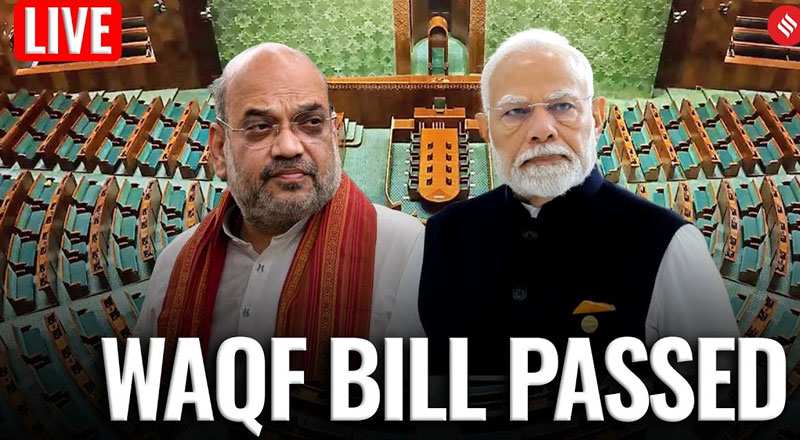In a marathon 12-hour debate stretching past midnight, the Lok Sabha passed the Waqf (Amendment) Bill, 2025, in the early hours of April 3. The bill, introduced by Union Minority Affairs Minister Kiren Rijiju, seeks to enhance the transparency, efficiency, and management of Waqf properties. With 288 votes in favor and 232 against, the passage of the bill was marked by heated exchanges, multiple voting divisions, and strong opposition from several political parties.
Now, as the bill heads to the Rajya Sabha, its fate remains uncertain amid ongoing political tensions and concerns raised by the opposition.
The Long Road to Passage: Debate, Division, and Disruptions
The Business Advisory Committee had initially allocated eight hours for the discussion. However, the high level of engagement from both the ruling party and the opposition extended the debate well beyond its scheduled time. The bill was tabled for discussion at 12 noon on April 2 and was finally put to vote at 12:06 am on April 3. The demand for three separate divisions further delayed the process, and the bill was officially passed around 2 am.
During the debate, Rijiju emphasized that the bill is not about religion but rather about ensuring better governance of Waqf properties. He argued that previous amendments to the Waqf Act, particularly those made by the UPA government, had created legal ambiguities that needed rectification. The opposition, however, raised concerns about potential government overreach and questioned the bill’s constitutionality.
Key Provisions of the Waqf (Amendment) Bill
- Technology-Driven Management: The bill introduces digital tracking and transparency measures to prevent mismanagement and misuse of Waqf properties.
- Addressing Legal Complexities: The amendment aims to streamline disputes over Waqf land and ensure that legal proceedings related to these properties are handled more efficiently.
- Improved Governance: By introducing stricter oversight mechanisms, the bill seeks to enhance the accountability of Waqf boards across the country.
Government’s Defense: A Call for Rational Debate
Union Minister Kiren Rijiju strongly defended the bill, dismissing claims that it was unconstitutional. “Some members have said that minorities are not safe in India. This statement is completely false. There is no place safer than India for minorities,” Rijiju stated. He emphasized that all communities, including smaller minority groups like the Parsis, live with dignity and without fear in India.
Rijiju also criticized opposition leaders for misleading the public, stating, “The changes made in the Waqf law by the UPA government gave it an overriding effect over other statutes, hence the new amendments were required.”
The minister also highlighted the extensive consultation process undertaken by the Joint Parliamentary Committee (JPC), calling it the most comprehensive parliamentary panel exercise in India’s democratic history.
Opposition’s Concerns: Allegations of Overreach and Bias
Despite the government’s reassurances, opposition parties fiercely contested the bill, calling it a step towards state interference in religious institutions. Several members argued that the bill violates constitutional principles and could be used to target specific communities.
Some INDIA alliance leaders also criticized the Congress for not taking a firmer stand, leading to divisions within the opposition ranks. The government, on the other hand, maintained that the bill is a necessary reform aimed at ensuring fairness and accountability in the management of Waqf properties.
The Bill Faces the Rajya Sabha Test
Following its passage in the Lok Sabha, the Waqf (Amendment) Bill is set to be introduced in the Rajya Sabha for further deliberation. The government faces a tougher challenge in the upper house, where the opposition holds more leverage.
If the bill clears the Rajya Sabha, it will become law, significantly altering the governance of Waqf properties in India. However, if the opposition successfully blocks it, the government may have to consider further negotiations or amendments to gain broader support.
A Pivotal Moment in Indian Legislative History
The passage of the Waqf (Amendment) Bill in the Lok Sabha marks a significant moment in Indian legislative history. While the government presents it as a necessary reform for better governance, the opposition views it as an encroachment on minority rights. As the bill moves to the Rajya Sabha, its fate remains uncertain, and the coming days will determine whether it will become law or face further hurdles.
Regardless of the outcome, the debate over the Waqf Bill highlights the complexities of balancing governance, minority rights, and constitutional principles in India’s evolving political landscape.
(With agency inputs)





